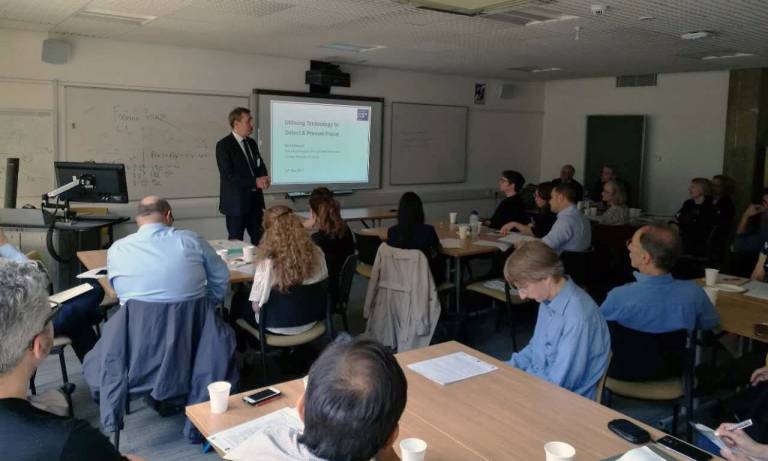Urban Informatics: Using Smart Cities to Deliver the New Urban Agenda
26 May 2017
CASA held a one-day workshop to examine the practical impact of new technologies -- collectively referred to as ‘Urban Informatics’ -- on planning and management as well as citizen engagement.

This event was designed to open-up the debate and included discussants from both practice and academia. The event will be crucial to the structuring of our project, which will review these issues largely from a UK-vantage point but also from a wider international context.
The purpose of the workshop was to understand the current level of progress, as well as challenges for policy makers and service deliverers, in several key areas within the public sector in the UK. This discussion was also held in the context of the NUA; it considered the relationships between the achievement of the SDG particularly in cities and understanding the blockages that are facing practitioners attempting to move forward their services. These blockages could be financial, cultural or technical, or a combination of all three.
In bringing together a group of participants with experience and knowledge in these fields, the project expected to identify potentially positive practices, blockages, and options for wider roll out. Following this workshop, there will be further research that may also take the form of interviews or small focus group discussions.
The issues we were seeking to investigate in the workshop
- What is working well in the use of technology for public service policy and delivery?
- What challenges are there?
- Are there any road blocks?
- What practices from other countries would be useful to consider in the UK?
- Where will UK public services be in five years?
- What opportunities are there for innovation in products, services, and delivery?
Following an introduction by Mike Batty to the project, the morning and afternoon sessions delivered thought-provoking content through stimulating presentations from our invited speakers.
Plenary session 1 – Delivering Public Services in a Smart Context
Chair: Mike Batty, CASA (UCL)
Trudi Elliott, Chief Executive RTPI:
‘New Urban Agenda and Smart City Regions’
Ian O’Donnell, Executive Director of Corporate Resources at Ealing Council:
‘Utilizing Technology to Detect Fraud’
Plenary session 2: 'The Smart City Challenges and Problems'
Chair: Elsa Arcaute, CASA (UCL)
Roger Savage, Client Director, Cities and International Development – Atkins Acuity:
‘Using Smart Cities to deliver the NUA - private sector perspective on the challenge and opportunity’
Alasdair Rae, Reader, Department of Urban Studies and Planning University of Sheffield:
‘From flashing dots and fancy graphics to useful knowledge: can data make a difference to how we plan transport in cities?’
Rob Kitchin, Social Sciences Institute (MUSSI), Geography National University of Ireland Maynooth: ‘Adoption gap issues for smart cities: Governance, citizenship, ethics’
In the parallel discussion groups that directly followed the presentations, a varied and engaging debate ensued from the participants led by Janice Morphet, Robin Morphet, Steven Gray, and Duncan Smith:
Group 1: Integrating the back office (Robin Morphet)
Group 2: Integrating services for the customer (Janice Morphet)
Group 3: Data analytics and large data sets (Steven Gray)
Group 4: From monitoring into policy (Duncan Smith)
At the end of each discussion group session, participants regrouped and the designated leaders provided summaries of the key ideas generated. This format was particularly useful in revealing the range of urban analytics and big data technologies, and the practical challenges involved in making progress in this area.
Andrew Collinge (Assistant Director, Intelligence, Greater London Authority) then closed the event by providing a summary of the day’s discussions points, which the team will use as a framework in preparation for the main conference in November, and to structure the remainder of the project. Andrew also provided the participants with a contextualization of the day’s discussions within the current and future work at the GLA.
Following this phase of work, the project will be holding a major conference for a wider discussion about urban analytics, smart cities, and interactions with the New Urban Agenda in 29th to 30th November 2017. This event will involve international speakers and contributors as well as those from the UK.
This workshop was supported by the MacArthur Foundation as part of the Urban Informatics project grant.
w: http://urbaninformatics.io/
Twitter: @urbaninformatix
 Close
Close

